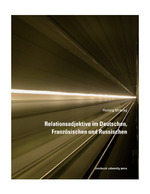Relationsadjektive im Deutschen, Französischen und Russischen
Author(s)
Mravlag, Hedwig
Collection
AG UniversitätsverlageLanguage
GermanAbstract
In the classification of adjectives numerous variants are possible. A rough classification into lexical-semantic point of view, the distinction of quality and Relations adjectives. Both in German and in French and Russian, this differentiation seems to have some significance, as many grammars to refer to them. Due to language-specific differences, it is in the analysis of relational adjectives in different languages particularly interesting to look at those alternative designs, with which relations adjectives in the source text for a translation or interpretation to be replaced. Bei der Klassifizierung von Adjektiven sind zahlreiche Varianten möglich. Eine grobe Einteilung in lexikalisch-semantischer Hinsicht ist die Unterscheidung von Qualitäts- und Relationsadjektiven. Sowohl im Deutschen als auch im Französischen und Russischen scheint diese Differenzierung eine gewisse Bedeutung zu haben, da zahlreiche Grammatiken auf sie hinweisen. Aufgrund sprachenspezifischer Unterschiede ist es bei der Analyse von Relationsadjektiven in verschiedenen Sprachen besonders interessant, sich jene alternativen Konstruktionen anzusehen, mit denen Relationsadjektive im Ausgangstext bei einer Übersetzung oder Verdolmetschung ersetzt werden. Der Fachbereich Politik eignet sich besonders für eine Analyse dieser Wortgruppe: Er produziert viel Material, das auch zugänglich ist, und beschäftigt sich mit sehr unterschiedlichen Bereichen wie Geschichte, Handel, Finanzwelt oder Wirtschaft, in denen es ständig zu Veränderungen kommt. Dies zwingt die Sprache, sich anzupassen und weiter zu entwickeln. Die Arbeit zeigt auf, dass es für Übersetzer/Dolmetscher durchaus von Vorteil ist, sich mit einem sprachlichen Detail auseinanderzusetzen. Wichtige Tendenzen und Gewohnheiten in den verschiedenen Sprachen treten zu Tage und können von großer Hilfe sein. Wissen in diesem Bereich kann dem in der Dolmetschsituation unter Zeitdruck stehenden Dolmetscher helfen, sich von der Konstruktion der Ausgangssprache zu lösen. Dem Übersetzer kann es durch solche Kenntnisse gelingen, eine noch authentischer klingende Übersetzung anzufertigen.
Keywords
linguistics; sprachwissenschaft; adjektive; adjective; Adverb; Dolmetscher; Frankreich; Französische Sprache; Komposition (Grammatik); Präposition; Russische Sprache; Russland; Substantiv; ÜbersetzerDOI
10.26530/OAPEN_483280ISBN
9783902811004OCN
963270883Publisher
innsbruck university pressPublisher website
https://www.uibk.ac.at/iupPublication date and place
2013Series
Studien des Interdisziplinären Frankreich-Schwerpunkts der Universität Innsbruck, 4Classification
Language and Linguistics
Writing systems, alphabets


 Download
Download Web Shop
Web Shop